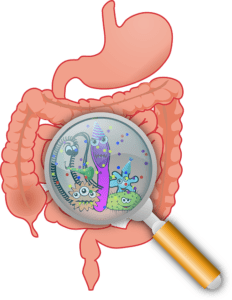Did you know that the health of your gut effects your entire body?
Did you ever wonder why the thought of speaking in public or going for a job interview ties your stomach in a knot? Or why your stomach feels like it flips when your overjoyed?
Like the brain, the gut is highly sensitive and full of nerves, so when a stressful or emotional event occurs, it has a profound effect on the digestive system.
How your gut works
 The term ‘digestion’ actually covers a collection of bodily processes that combine to “unlock” the value of food – both physically and chemically – to yield nutrients that can be absorbed and utilized. Most food can’t be used by the body in its natural state, so an intricate process occurs in the digestive system to convert everything you eat into a form that can then be absorbed and transported throughout the body.
The term ‘digestion’ actually covers a collection of bodily processes that combine to “unlock” the value of food – both physically and chemically – to yield nutrients that can be absorbed and utilized. Most food can’t be used by the body in its natural state, so an intricate process occurs in the digestive system to convert everything you eat into a form that can then be absorbed and transported throughout the body.
When your digestive system is working properly, the result is a general well-being and balance, which includes mental alertness, higher energy levels, a strong immune system and healing and repair throughout the body when illness or infection arises.
When the balance is lost
We know that any system can develop glitches, and digestive disruptions or disorders can and often do have a major impact on our health. Surveys suggest that digestive upsets that can’t be attributed to a specific condition or disease are quite common. In one survey, almost 70% of those responding reported having at least one of 20 different symptoms – including discomfort, indigestion, belching, and bloating – in the last three months.
These types of problems can create a domino effect: When our digestion is poor, we have less access to nutrients and energy -resources that are necessary for healing. So dysfunction in the digestive tract often doesn’t just remain there – it can result in symptoms anywhere in the body, including allergies, arthritis, asthma and chronic fatigue.
What causes an imbalance in the digestive system?
Poor digestion, poor absorption, and unhealthy bacteria in the gut lie at the root of most common digestive complaints and many other chronic conditions as well. The culprits may include certain “problem” foods such as beans or dairy, eating meals high in fat, habitually eating too fast or too much, and even eating while under stress. Other factors include:
- Getting older. The muscles of the GI tract may become less efficient, and you may be taking longer to digest your food. Some research suggests that older individuals may not be able to handle the digestion of high fat foods as well as when they were younger. And medications can also affect digestion, leading to constipation and other problems.
- Poor mealtime habits. Digestion can suffer when you continually eat on the go and in a rush. When food is not chewed well, salivation may be inadequate and food grinding may be incomplete. As a result, carbohydrate digestion may not get the jump-start it needs before reaching the stomach.
- Poor food choices. Heavy, fat-laden meals can take longer to digest. The digestion often associated with greasy foods may also be partly explained by the production of gases when fatty acids and stomach acid are neutralized in the small intestine. If trapped, this gas may contribute to bloating and discomfort.
How to keep the digestive tract in check
- Exercise. Regular physical activity stimulates digestion and promotes re-absorption and elimination of gas.
- Drink plenty of water. Water helps stimulate the flow of digestive juices and eases the passage of wastes.

- Consume adequate fibre. A diet high in fibre aids digestion and promotes regularity. If your dietary fibre intake is low, remember to increase the amounts you consume gradually to allow your body to adjust.
- Avoid overeating, particularly late at night and meals high in fat. A large meal that is rich in fat can be difficult to digest because fatty foods tend to stay in the stomach longer. Overeating prior to bedtime can also cause pain and bloating because lying flat can trap gas in the stomach and intestine.
- Manage stress. Stress can also play a big role in how well your digestive tract functions. Keeping stressful situations in perspective and maintaining positive outlets for stress relief is probably some of the best advice anybody can follow to protect both their digestive tract and overall health.
- Relax and enjoy your meals. Negative emotions can negatively affect digestion—witness the common expression ‘my stomach is in a knot’. Taking time to enjoy a meal can actually help the digestive process.
